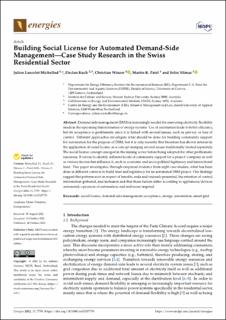Please use this identifier to cite or link to this item:
https://doi.org/10.21256/zhaw-26588| Publication type: | Article in scientific journal |
| Type of review: | Peer review (publication) |
| Title: | Building social license for automated demand-side management : case study research in the Swiss residential sector |
| Authors: | Michellod, Julien Lancelot Kuch, Declan Winzer, Christian Patel, Martin K. Yilmaz, Selin |
| et. al: | No |
| DOI: | 10.3390/en15207759 10.21256/zhaw-26588 |
| Published in: | Energies |
| Volume(Issue): | 15 |
| Issue: | 20 |
| Page(s): | 7759 |
| Issue Date: | 2022 |
| Publisher / Ed. Institution: | MDPI |
| ISSN: | 1996-1073 |
| Language: | English |
| Subjects: | Social license; Demand-side management; Acceptance; Energy; Automation; Smart grid |
| Subject (DDC): | 333.79: Energy |
| Abstract: | Demand-side management (DSM) is increasingly needed for answering electricity flexibility needs in the upcoming transformation of energy systems. Use of automation leads to better efficiency, but its acceptance is problematic since it is linked with several issues, such as privacy or loss of control. Different approaches investigate what should be done for building community support for automation for the purpose of DSM, but it is only recently that literature has shown interest in the application of social license as a concept merging several issues traditionally treated separately. The social license concept emerged in the mining sector before being adopted for other problematic resources. It serves to identify different levels of community support for a project/company as well as various factors that influence it, such as economic and socio-political legitimacy and interactional trust. This paper investigates, through empirical evidence from eight case studies, what has been done in different contexts to build trust and legitimacy for an automated DSM project. Our findings suggest that patterns exist in respect of benefits, risks and rationale presented, the retention of control, information gathered, and inclusion and that these factors differ according to appliances/devices automated, operators of automation, and end-users targeted. |
| URI: | https://digitalcollection.zhaw.ch/handle/11475/26588 |
| Fulltext version: | Published version |
| License (according to publishing contract): | CC BY 4.0: Attribution 4.0 International |
| Departement: | School of Management and Law |
| Organisational Unit: | Center for Energy and Environment (CEE) |
| Appears in collections: | Publikationen School of Management and Law |
Files in This Item:
| File | Description | Size | Format | |
|---|---|---|---|---|
| 2022_Michellod-etal_Building-social-license-for-automated-DSM.pdf | 1.07 MB | Adobe PDF |  View/Open |
Show full item record
Michellod, J. L., Kuch, D., Winzer, C., Patel, M. K., & Yilmaz, S. (2022). Building social license for automated demand-side management : case study research in the Swiss residential sector. Energies, 15(20), 7759. https://doi.org/10.3390/en15207759
Michellod, J.L. et al. (2022) ‘Building social license for automated demand-side management : case study research in the Swiss residential sector’, Energies, 15(20), p. 7759. Available at: https://doi.org/10.3390/en15207759.
J. L. Michellod, D. Kuch, C. Winzer, M. K. Patel, and S. Yilmaz, “Building social license for automated demand-side management : case study research in the Swiss residential sector,” Energies, vol. 15, no. 20, p. 7759, 2022, doi: 10.3390/en15207759.
MICHELLOD, Julien Lancelot, Declan KUCH, Christian WINZER, Martin K. PATEL und Selin YILMAZ, 2022. Building social license for automated demand-side management : case study research in the Swiss residential sector. Energies. 2022. Bd. 15, Nr. 20, S. 7759. DOI 10.3390/en15207759
Michellod, Julien Lancelot, Declan Kuch, Christian Winzer, Martin K. Patel, and Selin Yilmaz. 2022. “Building Social License for Automated Demand-Side Management : Case Study Research in the Swiss Residential Sector.” Energies 15 (20): 7759. https://doi.org/10.3390/en15207759.
Michellod, Julien Lancelot, et al. “Building Social License for Automated Demand-Side Management : Case Study Research in the Swiss Residential Sector.” Energies, vol. 15, no. 20, 2022, p. 7759, https://doi.org/10.3390/en15207759.
Items in DSpace are protected by copyright, with all rights reserved, unless otherwise indicated.